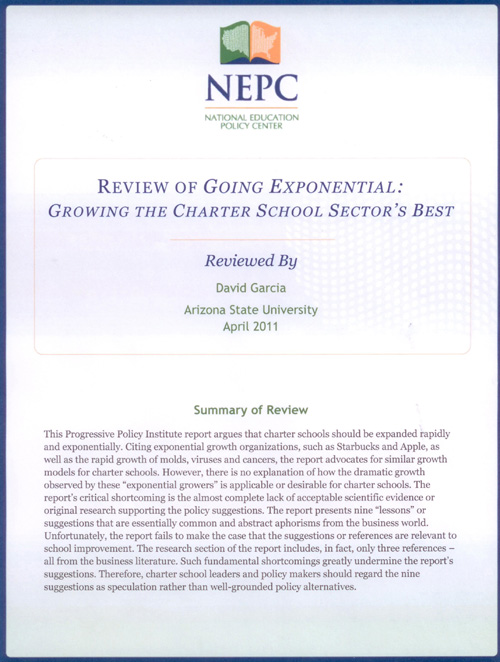Wal-Mart funds latest 'progressive' charter school propaganda... Latest charter school 'study' is just another fatuous marketing ploy, says academic review of the supposed evidence
It seems that just about every week or two another group comes out with another so-called "study" supposedly proving that charter schools ŌĆö or at least "the best" among them ŌĆö are the only viable solution to solving the problems facing urban public school systems. Having abandoned the urban systems that serve huge numbers of the nation's poorest (usually minority) children, America's right wing new aristocracy and corporate "school reform" leaders ŌĆö from President Barack Obama and U.S. Secretary of Education Arne Duncan and men like Chicago mayor-elect Rahm Emanuel ŌĆö now simply repeat, over and over, the endless talking points produced in these well funded but bogus "studies" .
 From a satiric point of view, the latest report from the so-called Progressive Policy Institute (cover picture above) could make "Saturday Nigh Live." From the happy faces on the cover to the corporate happy talk inside, the marketing brochure for expanding charter schools in the USA ŌĆö but only the "best" ones ŌĆö would make the Main Stage at Chicago's Second City if it were produced in Chicago. Hopefully, the Daily Show or some other national comedy show will begin with the cover, above, and delight an audience with everything else about the report. Although charter school propaganda requires that the children be arrayed in a typical diversity "rainbow" (as above), the superteacher smiling that perfect Valley Girl smile almost always has to be white (as above) and (probably) single (note that the right hand is showing). Blonde hair is optional, but sometimes preferred as well. Senior and veteran African American, white, or Latino teachers such as actually teach in the majority of urban public schools in the USA are not allowed in the picture, nor are the actual segregated classrooms filled with 35 or 40 poor children. The perfect charter school is precisely what its shown above, although Substance doubts that the Progressive Policy Institute realized how much it was satirizing itself when it covered its latest nonsense with that cover.The latest of these studies ŌĆö "Going Exponential: Growing the Charter Schools Sector's Best" ŌĆö came from an outfit called the "Progressive Policy Institute" and was released in February.
From a satiric point of view, the latest report from the so-called Progressive Policy Institute (cover picture above) could make "Saturday Nigh Live." From the happy faces on the cover to the corporate happy talk inside, the marketing brochure for expanding charter schools in the USA ŌĆö but only the "best" ones ŌĆö would make the Main Stage at Chicago's Second City if it were produced in Chicago. Hopefully, the Daily Show or some other national comedy show will begin with the cover, above, and delight an audience with everything else about the report. Although charter school propaganda requires that the children be arrayed in a typical diversity "rainbow" (as above), the superteacher smiling that perfect Valley Girl smile almost always has to be white (as above) and (probably) single (note that the right hand is showing). Blonde hair is optional, but sometimes preferred as well. Senior and veteran African American, white, or Latino teachers such as actually teach in the majority of urban public schools in the USA are not allowed in the picture, nor are the actual segregated classrooms filled with 35 or 40 poor children. The perfect charter school is precisely what its shown above, although Substance doubts that the Progressive Policy Institute realized how much it was satirizing itself when it covered its latest nonsense with that cover.The latest of these studies ŌĆö "Going Exponential: Growing the Charter Schools Sector's Best" ŌĆö came from an outfit called the "Progressive Policy Institute" and was released in February.
[The URL for "Going Exponential" for those who can't link from above is
http://www.progressivefix.com/going-exponential-growing-the-charter-school-sectors-best]
A scathing critique of "Going Exponential" came out this week.
No longer are the nation's charter school proponents claiming that charter schools will all be superior to what the pundits call the "failing" public schools. Following the leader of Arne Duncan, they now proclaim that education policy in the USA should replicate the "best" charter schools, much as corporations like Apple Computer and Starbucks supposedly went "exponential". The assumption that public schools can be operated like Apple or Starbucks is not questioned in this latest study.
Once again, the "study" was proved false after a careful review by the National Education Policy Center (NEPC) Think Tank Review. "The [Progressive Policy Center] report lacks any scientific evidence to support its advocacy, according to an expert third party review released today," NEPC states. One aspect of the lengthy report that needs more recognition is its funding. "Going exponential" thanks the Walton Family Foundation for funding it. That's "Walton" as in Wal-Mart, one of the group called by education historian Diane Ravitch as "The Billionaire Boys' Club" in her ground breaking history "The Death and Life of the Great American School System." The Waltons got their money's worth from the young researchers who produced this latest charter school marketing packet, although the material has as much reality behind it as those old advertisements that claimed that "99 percent of dentists survey chose _____ toothpaste..." as the toothpaste you should use. The careful reviews of pundits' work by the University of Colorado and Arizona State University continues with this latest effort.
 The summary of the NEPC review of "Going Exponential" explains the six pages of critique that follows. The URL for the critique of "Going Exponential" for those who can't link is: http://nepc. colorado.edu/ files/NEPC-TTR-PPI- Charters.pdf
The summary of the NEPC review of "Going Exponential" explains the six pages of critique that follows. The URL for the critique of "Going Exponential" for those who can't link is: http://nepc. colorado.edu/ files/NEPC-TTR-PPI- Charters.pdf
The NEPC press release follows here:
Exponentially Flimsy. Report presents no evidence to support its call to grow the charter school sector like a mold or cancer http://nepc.colorado.edu
BOULDER, CO (April 21, 2011)ŌĆöThe new report called Going Exponential: Growing the Charter School SectorŌĆÖs Best, from Progressive Policy Institute, calls for the implementation of policies that encourage charter schools to grow like a mold, virus or cancer. Exponentially Flimsy
Report presents no evidence to support its call to grow the charter school sector like a mold or cancer. http://nepc.colorado.edu
BOULDER, CO (April 21, 2011)ŌĆöThe new report called Going Exponential: Growing the Charter School SectorŌĆÖs Best, from Progressive Policy Institute, calls for the implementation of policies that encourage charter schools to grow like a mold, virus or cancer. The report lacks any scientific evidence to support its advocacy, according to an expert third party review released today.
The review is published by the National Education Policy Center, housed at the University of Colorado at Boulder School of Education.
The Going Exponential report was written by Emily Ayscue Hassel, Bryan C. Hassel, and Joe Ableidinger and was reviewed for the Think Twice think tank review project by Arizona State University professor David Garcia. The report begins with the premise that charter schools and charter management organizations (CMOs, which are non-profit networks of charter schools) are key to improving urban public schools. The report asserts that ŌĆ£the number of children served by the best charter schools is far too lowŌĆØ and that ŌĆ£millions more children would benefit if they had access to the nationŌĆÖs best CMOŌĆÖs and charter schools.ŌĆØ
The authors contend that this situation would be remedied if policy makers would encourage the rapid growth of good charter schools ŌĆö growth resembling the ŌĆ£exponentialŌĆØ growth curve of corporations like Apple Computer and Starbucks. The bulk of the report consists of nine ŌĆ£lessons from research about exponential growthŌĆØ for charter operators and policymakers to follow. Yet the report offers only minimal research evidence and provides no useful information about the research, which is taken from the business literature. The report also examines exponential growth observed in the natural world, specifically ŌĆ£mold, algae, cancer, crystals and viruses.ŌĆØ
The problem is, according to Garcia, that the reportŌĆÖs fundamental premise ŌĆö that ŌĆ£high exponential growthŌĆØ found in other kinds of organizations and organisms can be applied to charter schools ŌĆö is unsubstantiated. Garcia asks, for example, ŌĆ£How is the business transaction between a Starbucks barista and a customer applicable to the interaction between a teacher and student? How does the growth of viruses apply to the growth of charter schools?ŌĆØ
Going Exponential falls so far short of accepted academic standards that Garcia finds it is more properly compared to the popular business-advice book Good to Great, by Jim Collins, than to an academic policy report. He explains, however, that the report, ŌĆ£is executed with considerably less methodological rigorŌĆØ than the Collins book, which includes an extensive discussion of how its companies were selected.
Garcia concludes that Going Exponential simply does not provide adequate evidence to justify the guidance it offers up to charter school operators and policymakers.
Find David GarciaŌĆÖs review on the NEPC website at: http://tinyurl.com/3mllyoe
Find Going Exponential: Growing the Charter School SectorŌĆÖs Best by Hassel, Hassel & Ableidinger on the web at: http://tinyurl.com/3jr25wz
The Think Twice think tank review project (http://thinktankreview.org), a project of the National Education Policy Center, provides the public, policy makers, and the press with timely, academically sound, reviews of selected think tank publications. The project is made possible in part by the generous support of the Great Lakes Center for Education Research and Practice.
The mission of the National Education Policy Center is to produce and disseminate high-quality, peer-reviewed research to inform education policy discussions. We are guided by the belief that the democratic governance of public education is strengthened when policies are based on sound evidence. For more information on NEPC, please visit http://nepc.colorado.edu .
This review is also found on the GLC website at http://www.greatlakescenter.org/
CONTACT: David R. Garcia (480) 727-7413
d.garcia@asu.edu William Mathis, NEPC
(802) 383-0058
william.mathis@colorado.edu
’Ż┐

